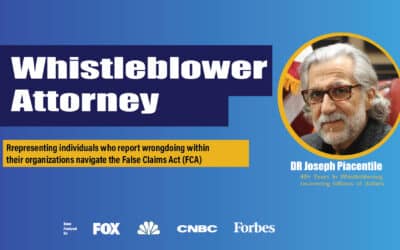EDUCATION FRAUD
EDUCATION FRAUD
Education fraud occurs when a school or university violates federally mandated standards or the Higher Education Act (HEA) to increase profits. Ruthless administrators cheat the system by enrolling more students or cutting costs. These schemes will eventually exert their burden on taxpayers as unqualified students whose grades were artificially inflated will fail to repay their loans. Blowing the whistle against this type of fraudulent practices help the government uncover those who prey on youths who want to receive an education to improve their lives.
HOW DOES EDUCATION FRAUD WORKS?
Higher education has become a lucrative business for thousands of colleges and universities across the country. Most of these institutes rely on the $150 billion they receive in federally backed student loans and grants to stay in business, so they can keep driving up enrollment prices without worrying about attendance. However, many schools still turn to fraud to increase their bottom line. Anti‐kickback laws are violated by illegally paying recruiters commissions, students grades are inflated to qualify for more grant money, and accreditation standards are failed to comply with in order to save on expenses. These education scams leave the future graduates with lackluster career prospects and overwhelming debt.
Unlike publicly funded state colleges or private nonprofit universities, for‐profit schools treat education as a business and try to maximize their profits by increasing enrollment while saving money on expenses like teacher salaries and extracurricular activities. High-pressure and deceptive sales tactics are often employed, such as misrepresenting the quality of their facilities and programs. A 2010 report by the Government Accountability Office found that almost all for‐profit institutions devised suspect and potentially fraudulent business practices. All forms of education fraud are prosecuted under the False Claims Act, which has its own provisions for whistleblower protection and rewards.
HARM CAUSED BY EDUCATION FRAUD
Schools that commit education fraud often have much lower graduation rates. The students who complete their studies often have difficulty finding a job that allows them to repay their loans, forcing the government and ultimately taxpayers to pay this price rather than the schools. The default rate among students who attend for-profit schools is over triple than that of those who attend public or private nonprofit colleges. Ultimately, these young citizens are fed false promises by unscrupulous educational institutions and are the primary victims of this type of scheme.
HOW TO REPORT AN EDUCATION FRAUD
We can be young only one time during our lives. during that time we got a single chance to change our lives by receiving a better education. Ruthless institutions who use their despicable schemes to steal taxpayers’ money do so regardless of the consequences on our youths’ future. Those unfortunate enough to graduate with a lackluster education will often find themselves overwhelmed by debts since they’re unable to properly develop their careers. By helping us stop these criminals by blowing the whistle, you are actively contributing to build a better future for your own sons and daughters.
Contact Us Today
The information submitted will be submitted to the law firm of Piacentile & Associates LLP d/b/a Whistleblowers International. This communication does not create an attorney-client relationship and is submitted only for the purpose of evaluating your claim to see if this is something we are able to help you with. By contacting us, you certify that you are a potential client making a bona fide inquiry about obtaining legal services to address a potential whistleblowing legal claim. Past results do not guarantee future outcomes. While this submission does not create an attorney-client relationship, all information submitted will be kept strictly confidential per legal ethics rules since this information is submitted in contemplation of a potential attorney-client relationship. No attorney-client relationship is formed until it is determined after evaluation with you that this is something we can take on and a retainer agreement is signed by you and the law firm of Piacentile & Associates LLP d/b/a Whistleblowers International. Please also understand that by submitting your information, there is no guarantee that we will contact you in response, as at any given time, there are only a limited number of claims we are able to take on and pursue. If we do not contact you within 3-business days of your submission, please reach out to another whistleblower law firm if you are interested in pursuing your matter.
Our Areas of Practice
HEALTHCARE FRAUD
Securities / Derivatives Fraud
Fraud Against the Government
Tax Fraud
Cryptocurrencies Fraud
Defense Contractor Fraud
Money Laundering
Foreign Corrupt Practices Act
DR. JOE’S CASES HAVE BEEN FEATURED IN:





COMMITTED TO GLOBAL TRANSPARENCY
Unmasking Investment Fraud: A Private Investigator’s Guide to Navigating Financial Scams
As a private investigator specializing in investment fraud cases, I've seen countless victims fall prey to sophisticated schemes that exploit their trust and hard-earned money. Over the years, I’ve gathered insights on how to spot fraud, protect investments, and take...
Whistleblower Attorneys: Protecting Those Who Speak Out Against Fraud
At Whistleblowers International, we specialize in representing courageous individuals who report fraud, misconduct, or illegal Whistleblower Attorneys: Protecting Those Who Expose Fraud At Whistleblowers International, we are...
Financial Crimes Enforcement Network (FinCEN): An Overview
The Financial Crimes Enforcement Network (FinCEN) is a bureau within the U.S. Department of the Treasury that plays a critical role in safeguarding the financial system against illicit activities such as money laundering, terrorist financing, and other financial...
What is FinCEN?
The Financial Crimes Enforcement Network (FinCEN) is a bureau of the U.S. Department of the Treasury dedicated to combating financial crimes, such as money laundering, terrorist financing, and other illicit activities that exploit the financial system. Established in...
PCBs and Cancer: Understanding the Risks and Connections
Polychlorinated Biphenyls (PCBs) are chemical compounds that were widely used in industrial applications before their ban in the late 1970s due to health concerns. One of the most significant risks associated with PCB exposure is cancer. Numerous studies have explored...
Understanding the Current PCB Legal Landscape and Emerging Cases
Polychlorinated Biphenyls (PCBs) Polychlorinated Biphenyls (PCBs) have been the subject of numerous lawsuits for decades due to their widespread use and enduring impact on the environment and public health. Despite being banned in the late 1970s, PCBs continue to pose...
Understanding PCB Exposure: Common Questions and Answers
What is PCB Exposure? Q: What is PCB exposure? A: PCB (Polychlorinated Biphenyl) exposure refers to contact with these man-made chemicals, which were widely used in various industrial applications from the 1930s until their production was banned in many countries in...
Top U.S. Government Contractors and the Risks of Procurement Fraud
The U.S. government is one of the largest purchasers of goods and services globally, spending hundreds of billions annually on contracts with private companies. While these contracts provide significant business opportunities, they also come with risks, including the...
Understanding Government Contract Fraud: Can Contractors Be Criminally Charged?
Government contract fraud is a significant issue affecting both the federal government and the private sector. With billions of dollars allocated to government contracts annually, instances of fraud have emerged as a critical concern. This article explores whether...
Understanding Securities and Commodities Fraud: Insights from a Lawyer’s Perspective
Securities and commodities fraud can be complex and overwhelming to navigate, especially if you're facing legal challenges in these areas. This blog post aims to shed light on the essential aspects of securities and commodities fraud, answering key questions and...
The information on this website is for general information purposes only. Nothing on this site should be taken as legal advice for any individual case or situation.
We do not accept cases in all jurisdictions. No representation is made that the quality of the legal services to be performed is greater than the quality of legal services performed by other lawyers. Prior results do not guarantee a similar outcome. This information is not intended to create, and receipt or viewing does not constitute, an attorney-client relationship. While we will treat any information provided as privileged and confidential, you should understand that when you provide information about a potential case to us, we do not become your attorneys. We do not represent you until we have agreed to do so and a retainer has been signed by both of us. This information is not intended to create, and receipt or viewing does not constitute, an attorney-client relationship. This website may be considered attorney advertising in some states.
© 2024 All Rights Reserved.




